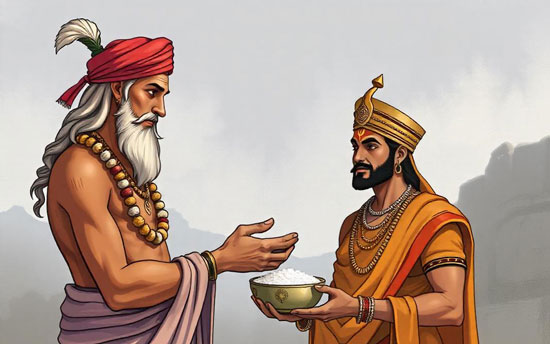The Tale of Hariswami and Lavanyavati
Explore the captivating tale of a Brahman's son Hariswami and his enchanting journey in Churapur. Discover love, loss, and fate today!
Hariswami and Lavanyavati
The 12th Tale of Betal Pachisi
The spirit said, "O king Bir Vikramajit! There is a city named Churapur, where a king named Churaman ruled, whose spiritual teacher's name was Devaswami, and he had a son named Hariswami. He was as beautiful as Cupid, equalled Brihaspati1 in his knowledge of scientific and religious treatises, and was as wealthy as Kuvera. He wedded and brought home a Brahman's daughter, whose name was Lavanyavati."
"To be brief, one night in the hot season they were both sleeping soundly on the flat roof of a summer house. The woman's veil accidentally slipped off her face, while a demi-god, seated on a car, was proceeding somewhere through the air. His gaze suddenly falling upon her, he lowered the car, and placing her, asleep, on the car, flew off with her. After some time the Brahman also awoke, and lo! his wife was not (beside him). On this he became alarmed, and coming down from thence, searched throughout the house. When he did not find her there either, he went about seeking her through all the streets and lanes of the city, but did not find her. Thereupon he began to say to himself, 'Who has carried her off? and whither has she gone?"'
"In short, when his efforts were of no avail, he returned home helpless and regretful, and searched for her there a second time, but did not find her. When the house appeared desolate to him without her, he lost all self-control in his disquietude and misery, and began crying out, Oh, darling of my soul! oh, darling of my soul! Further, being exceedingly agitated by her separation from him, he gave up the position of a householder, renounced the world, girt a simple waist-cloth round his loins, rubbed the ashes of burnt cow-dung on his body, put on a necklace of beads, quitted the town, and set out on a pilgrimage. Proceeding on his pilgrimage from town to town, and village to village, he reached a certain town at midday."
"When extreme hunger left him no alternative, he made a cup-shaped vessel of the leaves of a dhak-tree, and carrying it to the house of a Brahman, said to him, 'Give me some food in alms.' (The fact is, when a man comes under the influence of love, he has no thought of duty, caste, or food; and, regardless of everything, he eats food wherever he can obtain it.) When he begged alms of the Brahman, he (the Brahman) took the cup-shaped vessel from him and entered the house, and brought it (back) to him filled with rice boiled in milk. He took the cup, and came to the margin of a tank. There was a large banyan-tree there. He placed the cup at the root of that, and went to wash his face and hands in the tank."

"A black snake came out from the roots of the tree, and having dipped its mouth into the cup, went away; and so the whole contents of the cup had become poisoned, when, in the meantime, he also returned after washing his hands and face. This matter, however, was unknown to him; while hunger, on the other hand, beset him sorely. (Thus) he ate the rice and milk as soon as he came, and the poison instantly entered his system. Thereupon he went to the Brahman and said, 'Thou hast given me poison, and I am now dying of it.' Having said so much, he reeled and fell, and died. Again, the Brahman, seeing him dead, turned his own wife out of the house, and said, 'Go thou hence, thou murderess of a Brahman!'"
Having told so much of the tale, the spirit said, "O king! to which of these does the guilt of killing a Brahman attach?" The king said, "Poison exists in a snake's mouth as a matter of course; therefore, no guilt attaches to it. Again, the Brahman gave him alms, considering him to be hungry; (therefore) guilt does not attach to him. Further, the Brahman's wife had given him alms at the bidding of her husband; she, too, is without sin. And he ate the milk and rice unwittingly, and hence he also is guiltless. In short, whoever imputes guilt to anyone of these, is himself a sinner." On hearing this, the spirit went again and hung on to that tree; and the king also went there, and taking him down and binding him, placed him on his shoulder, and carried him away from there.
 Change Language:
Change Language:
Try out the other sections

 Craft Ideas for Kids
Craft Ideas for Kids Rhymes & Poems
Rhymes & Poems Benefits of Yoga for Kids
Benefits of Yoga for Kids School Projects & Homework Help
School Projects & Homework Help